2022: An Expansive Year
Our Founder/CEO Claudia Chwalisz reflects on the creation of DemNext and our big plans for 2023
The other day, someone asked me what my year would look like if it were a painting. Georgia O’Keeffe’s “Green, Orange and Yellow” came immediately to mind. The colours, the movement, the textures. The winding, serpentine path.
It captures the feelings of my year. Deciding what to do next at a critical juncture of my journeys, personal and professional (though I’ll write mostly about the latter here). Feeling the twists and turns, but also the joy and intensity.
It’s been such a crazy and exciting year, full of momentum. Slowing down over the holidays to look back and reflect has left me immensely grateful, wanting to also share some of the journey. Lots of people have asked me about it over the past months. I’m sharing in the hopes that this might be helpful or encouraging to anyone else contemplating taking the leap of leaving an established institution to create something new.
How did we build and launch DemocracyNext, a new institute?
I say we and not I, as this was no solo adventure. While I may have had an initial idea, there are many people who helped bring it to life.
The very idea of starting something new comes from a seed planted by Matyas Kovacs, who I met through the wonderful Exponential View community. Over a glass of wine, as we discussed potential futures, he asked me, “Why don’t you start something yourself?”
It was the needed prompt that then kept me up that night, buzzing. At 3am, I got up to write for a few hours, typing away as the ideas flowed. It was an initial sketch for what has eventually become DemocracyNext — our research and action institute working to shift power to everyday people through new institutions of citizen participation, representation by lot, and deliberation (such as empowered Citizens’ Assemblies).
Fearing I might see my thoughts as folly in the light of day, I sent off the draft outline (a 6 page document) at 5am to a few trusted friends: Ieva Cesnulaityte; Hélène Landemore; David Van Reybrouck; Jon Alexander; Panthea Lee; Peter MacLeod; Robbie Stamp; Lex Paulson; Jessica Feldman, James MacDonald-Nelson, and Brynn Higgins-Stirrup.
“Does it sound crazy, or could it be possible? And would you want to be involved if so?”
Following replies of excited encouragement, though also some questions, one month later we had a first group call to discuss the idea and next steps.
We might have been in a phase of internal conversations for a while longer if not for a chance encounter around this same time between Jon Alexander and Kevin O’Neil, Director of the New Frontiers programme at the Rockefeller Foundation. At this stage, it was merely an opportunity to share the idea and get some early feedback without any pressure.
A Turning Point
Little did I know that this 30 minute call would be a turning point that would take the idea from the far-out realms of tentative exploration into the beginnings of a serious endeavour to make it happen.
Kevin suggested that we apply to host a convening at the Rockefeller Foundation’s Bellagio Center on Lake Como, to help us accelerate being ready to launch. Ready to launch?! We were quite far from having certainty that we would indeed launch anything at all, let alone accelerate it.
But it was precisely the sort of confidence boost we needed to put the wheels in motion. We had only a few days to put together an application, so with Ieva and Jon, we gave it a chance. We were convinced of the value of bringing together a group of people to reflect collectively on defining our mission and strategy. With the Bellagio Center fully booked for most of the year, our fingers were crossed that we might get selected in case of a cancellation.
It prompted me to start sharing the draft concept note, already evolving with initial feedback, a lot more widely, and to begin contacting people I knew at other foundations.
At the point when we were about to give up and consider options for a plan B for the convening, we got the good news that there was a cancellation in one month’s time. Could we bring together a group and design an agenda in time to make it meaningful? Slight stress, but yes, we most certainly could. And we did.
Incubating DemocracyNext at the Bellagio Center
We brought together 18 people who, despite the short notice, came to meet us in Italy from all corners of the globe — from Australia to Chile, the US, Korea, and all over Europe. A mix of democracy practitioners, senior civil servants, politicians, academics, artists, designers, funders, technologists, entrepreneurs, and writers. I am still immensely grateful to everyone who volunteered a full week in their busy lives to help us, bringing their energy, ideas, and enthusiasm. Thank you Josh Babarinde, Mark Cridge, Yves Dejaeghere, Zakia Elvang, Jessica Feldman, Susan Nakyung Lee, Juha Leppänen, Rose Longhurst, Vera Sacchetti, Phoebe Tickell, Camila Vergara, and Iain Walker (and Ieva and Jon of course, as well as a few others, who for various reasons would like to keep their participation private)!
It still feels like a bit of a dream. While we had been having lots of bilateral conversations about our ideas, there is immense value in the collective intelligence that emerges from bringing together a motivated, brilliant, diverse group of people to think together.
We had some concrete decisions and outputs we wanted to reach by the end of our time together, making it more than just a space for interesting conversations. The convening helped us reach some breakthroughs in defining our mission, identifying our priorities, the sorts of activities we would and would not engage in.
The setting meant we spent most of the time in small groups outdoors, seated on the grass under the trees, or on the benches by the lake, rather than in the conference conference:
As Ieva nicely put it afterwords, we had opened many doors in our explorations. The convening gave us the space to thoughtfully consider what each one entailed, and to intentionally close some of them. It gave us greater confidence in the ones we decided to keep open.
I will never forget the moment on the last day, during the last session of an intense week. We were sitting in a circle on the grass outside the library, overlooking the grounds, the lakes, and the mountains. Everyone shared one thing they had taken away from the week for themselves, and one thing they had taken away for DemocracyNext. And it ended in a spontaneous group hug. It was a touching and beautiful moment of friendship, which reminds me that this has been so much more than just a work adventure or a career step. We are one part of a much larger ecosystem of people and organisations who are working together in different ways for these wider goals of a more just, joyful, and collaborative future.
From the Bellagio Incubation to Launching DemocracyNext
The fact that the convening at Bellagio was going to take place was the deciding moment for Ieva and I to give in our notices at the OECD. Nothing was certain yet, but it was a decision that we were going to be serious and make it happen one way or another. The timing and funding and other details would be figured out.
Following the convening, we rode on the energy to figure those things out. Conversations with funders moved into more formal processes of submitting written proposals, often with some back and forth. Besides Kevin and his colleague Taylor Denson at the Rockefeller Foundation, we are equally extremely grateful to the support that we received from Enrique Bravo-Escobar at the National Endowment for Democracy, Rose Longhurst and Finn Heinrich at the Open Society Foundations, and Evan Steiner at One Project. It is often the logos of these foundations that get shared and recognised, but I’ve learnt how much the efforts of individuals within these institutions make all the difference. They are often behind the scenes, but they truly believe in the people they fund and want their missions to succeed.
Our Legal Setup
It was quite the learning curve to research various options for the legal set-up of a research institute that is non-profit and non-partisan, with an international team, receiving funding from funders in various countries.
Rather than setting up our own non-profit association, we opted to set up as a collective with Open Collective Europe — our page is here. They are a Non Profit Organization dedicated to providing a simple, open, lightweight path for charitable initiatives and communities to manage their finances across Europe. It enables us to operate transparently with ease, and to operate under the status of a charity registered in Belgium with 501(c)3 equivalency.
Giving DemocracyNext a Visual Identity
On the funner side of things, it has been wonderful working with the team at Yukiko Studio for our visual identity and website (Sebastian Millot, Johannes Conrad, Tina Cucu, Tonia Kozlova). As well as with our illustrator, Adèle Vivet, whose work will be on our full website launched at the start of the new year! (Also a learning curve to realise the complexity and time needed to develop a website — the full site will be launched really soon!) We are very grateful to our Advisory Board Member Hugh Pope who was invaluable in this process.
Launching on the International Day of Democracy 2022
And all of this came together for our Launch on 15 September, the International Day of Democracy. Despite the global Zoom crash that I will never forget (!!), it was moving and powerful to bring together hundreds of people from around the world to mark this moment.
Our launch event involved some of our Advisory Board Members: Panthea Lee (Reboot, New York), Brenda Ogembo (Kenyan Parliament), Art O’Leary (Secretary General, Irish Electoral Commission), David Van Reybrouck (Founder of G1000 Belgium, author of Against Elections), Hélène Landemore (Professor, Yale University, author of Open Democracy), as well as DemocracyNext’s founding team — Ieva and I, and our Strategic Advisors Jon Alexander, Hélène Landemore, and Mark Cridge.
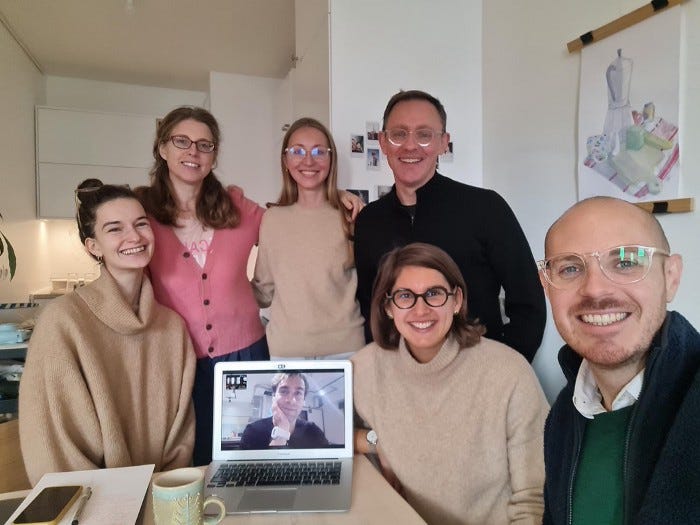
We are now a team of four, with Ansel Herz as our Communications Director and James MacDonald-Nelson as Project Lead for Urban Design and Planning. Soon we’ll be 5 as we’re in the midst of hiring a COO. We have 3 Fellows — Michael McCarthy (Economic Democracy), Gustav Kjær Vad Nielsen (Spaces for Deliberation), and Laurie Drake, PhD (Community-Building).
We are also supported by an incredible team of Advisory Board Members, who provide us with strategic guidance and support to our work: Nicole Curato, Panthea Lee, Brenda Ogembo, Art O’Leary, Hugh Pope, Alice Rawsthorn, Felipe Rey, Robbie Stamp, Olúfẹ́mi O. Táíwò, Ece Temelkuran, and David Van Reybrouck (their bios are on our website here).
A Few Highlights from 2022
Our final contributions before leaving the OECD included the publication of the OECD Evaluation Guidelines for Representative Deliberative Processes, and a Policy Paper on 8 Ways to Institutionalise Deliberative Democracy. We launched both at a joint event with the Centre for Deliberative Democracy and Global Governance. They completed the OECD Deliberative Democracy Toolbox that Ieva and I developed over the course of 4 years, which also includes a public database of 600 case studies of Citizens’ Assemblies, the flagship Catching the Deliberative Wave report, and Good Practice Principles.
I had the honour of being involved in the design of the permanent Brussels Citizens’ Assembly for Climate — a process led by David Van Reybrouck and the G1000 at the initiative of Environment Minister Alain Maron. It was exciting to see this announced in November!
Noema Magazine published an essay I wrote “A Movement That’s Quietly Shaping Democracy for the Better” — about how Citizens’ assemblies can help us better address societal challenges, overcome polarization and strengthen trust. It gives an overview of the global trends, as well as the workings of the permanent Paris Citizens’ Assembly.
I spoke at the Hannah Arendt Center Summer School for Citizens’ Assemblies at Bard College — a first in the US! My colleague Ieva also spoke at a virtual event about a Citizens’ Assembly for Los Angeles (read our newsletter about it). It feels like something will happen in the US this year!
I also spoke at the United Nations Forum on Human Rights, Democracy, and Rule of Law — putting forth the provocation “What if elections were not the heart of democracy” in this formal setting.
And one of the last exciting gatherings of this year was a workshop at Harvard organised by Bruce Schneier, where I had the privilege of hearing from some brilliant folks like James Bridle, Eli Pariser, Lawrence Lessig, Beth Noveck, Rob Reich, and many others! I’m grateful it gave me a chance to meet Deb Roy, who directs MIT’s Center for Constructive Communication, whose colleagues, particularly Dimitra Dimitrakopoulu, I also had the pleasure of meeting. I’m excited that we’ll collaborate with them in the future.
What’s Next at DemNext?
As 2023 gets underway, we have quite a few exciting projects and collaborations underway:
With Ieva we’re developing a simple online tool/platform for running a Citizens’ Assembly that will help enable people to be able to understand and run a deliberative assembly with members selected by lottery (whether for a government, a student council, a local association, or other organisation)
We are collaborating with the MIT Center for Constructive Communication on how the technology they have been developing can help support different stages of a Citizens’ Assembly process (see their most recent paper about digital civic sensemaking)
Ieva is leading the development of Guidelines for Institutionalising Empowered Citizens’ Assemblies, which will be a framework for our implementation projects. We’re coordinating these efforts with David Schecter (Democracy R&D Network), Felipe Rey (iDeemos), and Kyle Redman (newDemocracy Foundation), who are working on a related project on institutionalising deliberative democracy
We are collaborating with Design and Democracy (Amelie Klein and Vera Sacchetti), the Bundeskunsthalle in Bonn (working with Eva Kraus and Johanna Adam) and the Staatliche Kunstsammlungen Dresden— Kunstgewerbemuseum (working with Thomas A. Geisler) to implement Citizens’ Panels to Democratise the Museums in 2023, and on an Exhibition on Democracy to open in the respective institutions in 2024 and 2025. Stay tuned for more info soon!
I am co-authoring a chapter with Vera Sacchetti and Amelie Klein on physical spaces for deliberation for an edited volume by Markus Miessen. James MacDonald-Nelson and Gustav Nielson are also collaborating on a paper with iterations in drawings that build on the concluding question of combining permanence with flexibility
We are also exploring a collaboration with Aarhus municipality in Denmark (with thanks to Paul Natorp from Sagler der Samler) to experiment with new forms of governance for Urban Design and Planning Decisions
We have established a collaboration with our Fellow Michael McCarthy, Hélène Landemore, #DemocratizingWork (Isabelle Ferreras) and Demos Helsinki (Juha Leppanen) on Democratising the Economy, with a likely first focus on trade unions
We are exploring a collaboration to establish a Citizens’ Panel at a National Development Bank
We are co-authoring a joint paper with proposals for a Permanent and Empowered EU Citizens’ Assembly with Kalypso Nicolaidis, Yves Sintomer, and Carsten Berg, which we’re updating following a workshop Kalypso hosted at the European University Institute School of Transnational Governance in September 2022
With Ansel, Ieva, Mark, and Jon, we are working with our Fellow Laurie Drake to establish a DemocracyNext Community — we’ll be figuring out the model for how this will work with intention to launch in the first half of 2023
The Biden Summit for Democracy is taking place in March — we’ve been part of the Cohort on Deliberative Democracy and Citizens’ Assemblies, developing recommendations for countries to sign up to at the Summit. Ieva has been co-leading with Gazela Pudar Drasko a group developing propositions for a Marshall Plan for Democracy, starting with Central and Eastern Europe, and Ieva and I are involved in the group developing propositions for a Global What Works Centre for Deliberative Democracy given all our previous work in developing standards while at the OECD
Ieva is leading our work in Central and Eastern Europe and Ukraine.Beyond the Biden Summit activities, we are collaborating with Éva Bördős (DemNet) and Teele Pehk doing advocacy, community and field-building in the region, as it’s at the frontier of autocracy with a lot of potential for transformation
And more under exploration…
We’ve launched a newsletter — sign up to stay updated about our work and find out how you can get involved! Or find us on Twitter, LinkedIn, YouTube, Facebook, Instagram, TikTok, Mastodon, or Medium.
Sources of Inspiration This Year:
A few of the books that marked or inspired me in some way:
Hope in the Dark by Rebecca Solnit. A gift from Robbie Stamp, a friend and DemocracyNext Advisory Board member. The emphasis on the spaciousness of uncertainty as a call to action speaks to me.
4,000 Weeks By Oliver Burkeman. I learned the concept of the “Joy of Missing out” (and trying, with more or less success, to live it).
Wild by Jay Griffiths. It speaks to the wild part of my soul, the part that feels most alive hiking in the mountains, swimming in the sea, sleeping in the open air. There were also some relevant passages on democracy — notably a line I’ve come to appreciate, that “to recognise that there are different ways of knowing, and different ways of seeing, is the beginning of democracy”.
La Rencontre by Charles Pépin. For making me conscious of how I am someone very open to “rencontres” — not limited to the romantic, in the wider sense of friendship and intellectual encounters. It gave me an appreciation of how much our lives are shaped by the people we meet and our openness to exchanging with them, and being vulnerable.
961 heures à Beyrouthe by Ryoko Sekiguchi. I devoured this little book when it came out, making me want to go back to Beirut. A delightful read that anyone who has spent some time in Lebanon will appreciate.
On Revolution by Hannah Arendt. I read passages of this book of Arendt’s, which I hadn’t read before, but is perhaps one of the most relevant for our explorations on the future of democracy today.
The Extended Mind by Annie Murphy Paul. So much to say, but this book about embodied and social cognition has a great deal of relevance for our thinking on designing democratic institutions. The epistemic conditions needed for good decision making are very much related to the studies in this book on why we think, reason, and learn better in person and in groups. I will write a longer piece on this.
Philosophy of an Explorer by Erling Kagge. Simple and beautiful. I will never be an explorer in the way he was, but it’s a reminder that when you set your mind to doing something, the question is “how”, not “if”. Also appreciated the aesthetics of it; thick paper and beautiful images from his expeditions.
The Unbearable Lightness of Being by Milan Kundera. Finally picked this up this classic after seeing it referenced multiple times recently. On love and human existence, and that ultimate dilemma we all face of never knowing which decision is better or “right”.
“We can never know what to want, because, living only one life, we can neither compare it with our previous lives nor perfect it in our lives to come… We live everything as it comes, without warning.”
What’s On My Reading List Next:
Ways of Being: Beyond Human Intelligence by James Bridle. After meeting James, I am even more excited to read his latest book. I’ve been enjoying Krista Tippett’s reflections on it in her On Being newsletter The Pause.
Limonov by Emmanuel Carrère. Started this in the past few days after a conversation with a friend about it recently. Carrère is one of my favourite contemporary French authors, and it’s interesting to dip into now given the Russian War in Ukraine.
A History of Pictures by David Hockney and Martin Gayford. My current morning read — a chapter before I start my day.
Freedom by Annelien de Dijn. A recommendation by Kalypso Nicolaidis, which I am curious to read, about how conceptions of freedom have evolved over time in the West.
A Half-Built Garden by Ruthanna Emrys. This science fiction novel has been recommended to me more often than any other book in the past few months, so I’ve finally bought myself a copy.
2023: Ode to Joy
While I don’t yet know what word or feeling will best encapsulate 2023, the ones I have as it begins are inspired by another female artist, whose work I saw last week, Joan Mitchell. Her Ode to Joy, inspired by Frank O’Hara’s poem of that title, was one of my favourites in her retrospective.
So, here’s to a year of joy!






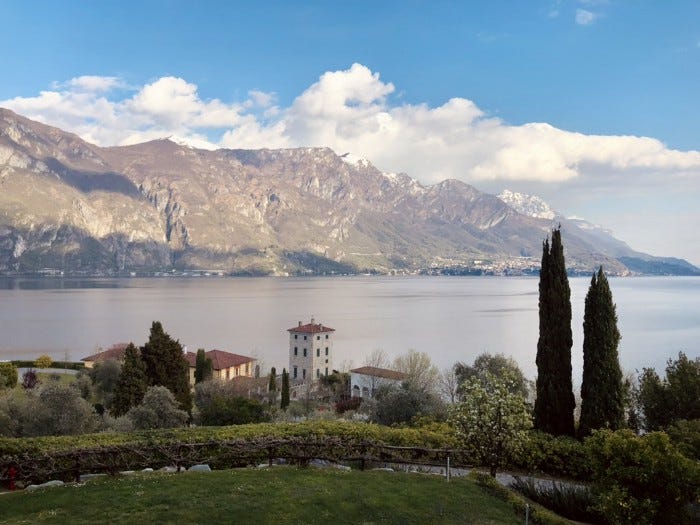
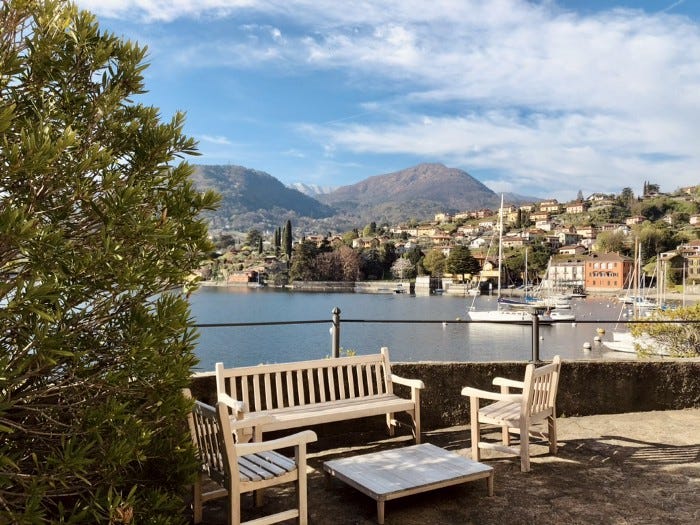
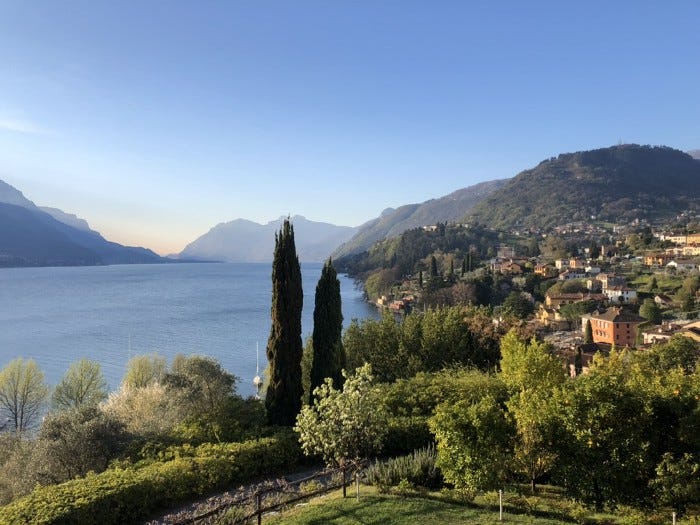


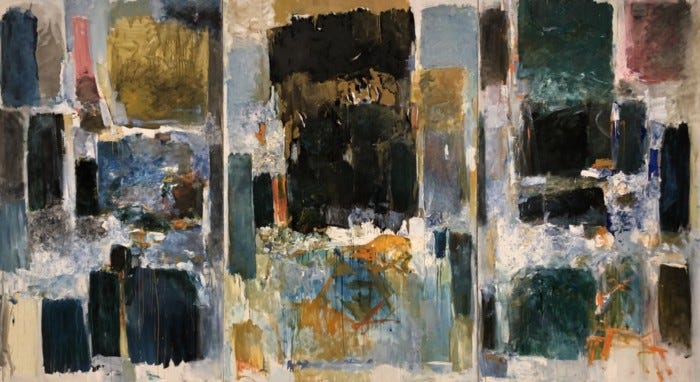
This is so inspiring, Claudia. Thank you for sharing! As a fellow non-profit starter I cannot but be grateful that there are such excellent examples of daring to create a new project in promotion of personal values, especially when it's such a challenge to established norms (like sortition and deliberation are). I wish you and demnext all the best, and we'll hopefully join forces at some point!
Wow!
Thanks for sharing your exciting and informative story. I’d be very interested to explore how the AI Collective can collaborate with you.
Our mission is to democratise AI and to do this we are taking our learnings (I wrote the CIM Specialist Award in AI Marketing) to a global community through Timebanking.
Is this of interest to you?
Also, I share your love of Como (and Lago D’Iseo!).
Auguri, Nadio.